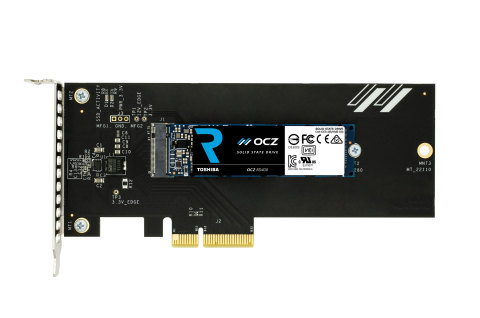New M.2-based RD400 SSDs deliver ultra-fast and compact storage performance for gaming and enthusiast systems
SAN JOSE, Calif. — (BUSINESS WIRE) — May 24, 2016 — Toshiba America Electronic Components, Inc., a committed technology leader, today announces the Toshiba OCZ RD400 Non-Volatile Memory Express® (NVMe1) solid state drive (SSD) series. Designed for cutting-edge notebooks and PCs, the Peripheral Component Interconnect Express® (PCIe® 2) RD400 series provides improved storage bandwidth and enhanced latency3 resulting in a fast and responsive computing experience.
This Smart News Release features multimedia. View the full release here: http://www.businesswire.com/news/home/20160524005492/en/

Toshiba OCZ RD400 (Photo: Business Wire)
Unlike Serial Advanced Technology Attachment (SATA) based SSDs utilizing the legacy Advanced Host Controller Interface (AHCI) protocol, NVMe is the first storage protocol designed with SSDs in mind making the RD400 series one of Toshiba’s fastest consumer SSDs to date. Additionally, the RD400’s PCIe Gen3 x4 lane interface shatters the traditional SATA bottleneck by delivering over four times the performance of SATA SSDs4. The RD400 series features sequential read/write speeds of up to 2,600 MB/s and 1,600 MB/s and random read/write performance of up to 210,000 and 140,000 4KiB5 input/output operations per second (IOPS) 6.
“The launch of the new Toshiba OCZ RD400 SSD series delivers enthusiast-level performance in both a compact M.2 and adapter card form factors to provide end-users with high bandwidth and platform flexibility for next-generation NVMe and PCIe mobile and desktop systems,” said Steve Fingerhut, Senior Vice President and GM of SSD BU, at Toshiba America Electronic Components, Inc. “The RD400 gets back to the OCZ brand’s enthusiast roots and offers power-users, gamers, and professionals a cutting-edge storage solution designed to support demanding consumer applications.”
The RD400 series is targeted at both desktop and notebook users, but the compact M.2 2280 form factor enables ultra-thin notebooks7 to take advantage of PCIe speeds. Desktop users can still harness the power of the RD400 even if they don’t have an M.2 slot by purchasing the PCIe adaptor card version. Both models will be available in capacities of 128GB, 256GB, 512GB, and 1024GB8.
RD400 SSDs feature Toshiba 15nm MLC NAND flash memory and an endurance rating of up to 592TBW9. Each drive is backed by a 5-year advanced warranty program10 that strives to minimize the aggravation surrounding traditional support and warranty claims.
For more information, visit our product page here.
About Toshiba Corp. and Toshiba America Electronic Components, Inc. (TAEC)
Toshiba America Electronic Components, Inc. is an independent operating company owned by Toshiba America, Inc., a subsidiary of Toshiba Corporation, Japan’s largest semiconductor, solid state drive and hard disk drive manufacturer and the world’s seventh largest semiconductor manufacturer (Gartner, 2015 Worldwide Semiconductor Revenue, January, 2016). Founded in Tokyo in 1875, Toshiba is at the heart of a global network of over 580 consolidated companies employing over 199,000 people worldwide. Visit Toshiba's web site at http://toshiba.semicon-storage.com.
About OCZ
OCZ is an enthusiast SSD brand offered by Toshiba for the consumer market. More information is available at www.ocz.com.
© 2016 Toshiba America Electronic Components, Inc. All Rights Reserved.
Information in this press release, including product pricing and specifications, content of services and contact information, is current and believed to be accurate on the date of the announcement, but is subject to change without prior notice. Technical and application information contained here is subject to the most recent applicable Toshiba product specifications.
1 NVMe and NVM Express are a trademark of NVM Express, Inc.
2 PCIe and PCI Express are a registered trademark of PCI-SIG
3 Compared to traditional SATA interface based HDDs and SSDs
4 Speed may vary depending on the host device, read and write conditions, and file size.
5 A kibibyte (KiB) means 210, or 1,024 bytes, a mebibyte (MiB) means 220, or 1,048,576 bytes, and a gibibyte (GiB) means 230, or 1,073,471,824 bytes
6 Based on the 512GB model, see ocz.com for full specifications
7 Must be equipped with an M.2 PCIe slot and interface
8 Definition of capacity: Toshiba defines a megabyte (MB) as
1,000,000 bytes, a gigabyte (GB) as 1,000,000,000 bytes and a terabyte
(TB) as 1,000,000,000,000 bytes. A computer operating system, however,
reports storage capacity using powers of 2 for the definition of 1GB = 230 =
1,073,741,824 bytes and therefore shows less storage capacity. Available
storage capacity (including examples of various media files) will vary
based on file size, formatting, settings, software and operating system,
such as Microsoft Operating System and/or pre-installed software
applications, or media content. Actual formatted capacity may vary








